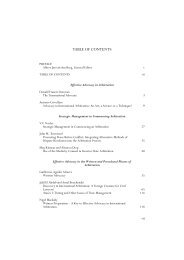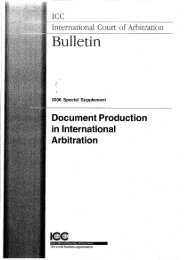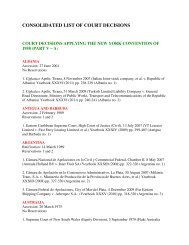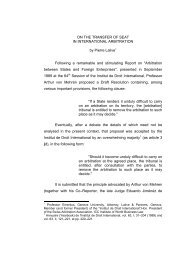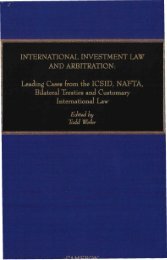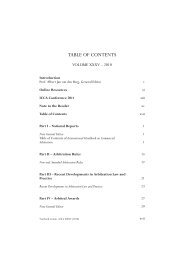Limits to Party Autonomy in International Commercial Arbitration
Limits to Party Autonomy in International Commercial Arbitration
Limits to Party Autonomy in International Commercial Arbitration
Create successful ePaper yourself
Turn your PDF publications into a flip-book with our unique Google optimized e-Paper software.
How does this conclusion sit with article 19(1) of the Model Law? As noted above, article 19(1) states<br />
that "subject <strong>to</strong> the provisions of this Law, the parties are free <strong>to</strong> agree on the procedure <strong>to</strong> be followed by<br />
the arbitral tribunal <strong>in</strong> conduct<strong>in</strong>g the proceed<strong>in</strong>gs". Is this freedom limited <strong>to</strong> an agreement reached by<br />
the parties before the arbitral tribunal agrees <strong>to</strong> be appo<strong>in</strong>ted, or also afterwards? This issue was<br />
discussed dur<strong>in</strong>g the draft<strong>in</strong>g of the Model Law:<br />
"one matter that was considered at some length dur<strong>in</strong>g the draft<strong>in</strong>g of article 19 was whether there<br />
should be a limitation on when the parties could agree on a procedural po<strong>in</strong>t. The Secretariat suggested<br />
that the Work<strong>in</strong>g Group amend draft article 19 so as <strong>to</strong> require that any agreement on the arbitral<br />
procedure be reached before the first or sole arbitra<strong>to</strong>r was appo<strong>in</strong>ted. The rationale for the proposal<br />
was that the rules of procedure should be clear from the outset and that any arbitra<strong>to</strong>r should know from<br />
the beg<strong>in</strong>n<strong>in</strong>g the rules under which he or she is expected <strong>to</strong> perform his or her functions. The Work<strong>in</strong>g<br />
Group rejected this idea, f<strong>in</strong>d<strong>in</strong>g <strong>in</strong>stead that the freedom of the parties <strong>to</strong> agree on a procedure "should<br />
be a cont<strong>in</strong>u<strong>in</strong>g one"; the Work<strong>in</strong>g Group <strong>in</strong>terpreted paragraph 1 <strong>to</strong> provide for such a cont<strong>in</strong>u<strong>in</strong>g<br />
freedom. The matter was raised aga<strong>in</strong> before the Commission, where conflict<strong>in</strong>g proposals were<br />
offered, one that the Work<strong>in</strong>g Group's understand<strong>in</strong>g be made explicit and the other that it be<br />
reconsidered. After extended discussion, the Commission decided not <strong>to</strong> change the Work<strong>in</strong>g Group's<br />
draft. There was some sentiment <strong>in</strong> favour of each proposal, but it was noted that <strong>in</strong> any case the<br />
arbitra<strong>to</strong>rs could not be forced <strong>to</strong> accept any procedures with which they disagreed, s<strong>in</strong>ce they could<br />
always resign rather than carry out the unwanted procedural stipulations. Moreover, if the matter was of<br />
strong concern, the tim<strong>in</strong>g of any agreement on procedure could be regulated by agreement between the<br />
parties and the arbitra<strong>to</strong>rs." 13<br />
In an arbitration conducted under the Model Law, the parties therefore have freedom <strong>to</strong> agree on the<br />
procedure even after the tribunal has entered <strong>in</strong><strong>to</strong> its contract with the parties.<br />
The question that arises next is whether article 19(1) is manda<strong>to</strong>ry and cont<strong>in</strong>u<strong>in</strong>g or can be fettered by<br />
the parties themselves. If it is manda<strong>to</strong>ry then, regardless of whether the arbitration agreement specifies<br />
the procedure <strong>to</strong> be followed, or nom<strong>in</strong>ates a set of procedural rules, the parties would rema<strong>in</strong> able <strong>to</strong><br />
agree on, and direct the tribunal <strong>to</strong> follow, procedural steps <strong>in</strong>clud<strong>in</strong>g <strong>in</strong> relation <strong>to</strong> time limits. The<br />
correct answer, it is suggested, is that article 19(1) is not manda<strong>to</strong>ry. Holtzmann and Neuhaus take the<br />
same view:<br />
"[a]s was noted by the Work<strong>in</strong>g Group, the freedom of the parties under paragraph (1) <strong>to</strong> agree on the<br />
procedure is a cont<strong>in</strong>u<strong>in</strong>g one throughout the arbitral proceed<strong>in</strong>gs and not limited, for example, <strong>to</strong> the<br />
time before the first arbitra<strong>to</strong>r is appo<strong>in</strong>ted ([Fifth Work<strong>in</strong>g Group Report,] A/CN.9/246, para. 63). It is<br />
submitted however, that the parties themselves may <strong>in</strong> their orig<strong>in</strong>al agreement limit their freedom <strong>in</strong><br />
this way if they wish their arbitra<strong>to</strong>rs <strong>to</strong> know from the start under what procedural rules they are<br />
expected <strong>to</strong> act." 14<br />
To hold otherwise, it is suggested, would defeat policy goals underp<strong>in</strong>n<strong>in</strong>g the Model Law. It may for<br />
example permit the parties <strong>to</strong> agree, after an arbitration has been commenced, on the removal of elements<br />
of an <strong>in</strong>stitutional arbitration which the adm<strong>in</strong>ister<strong>in</strong>g body could not accept. An illustration would be an<br />
agreement <strong>to</strong> remove ICC Court scrut<strong>in</strong>y of awards <strong>in</strong> an arbitration under the ICC Rules, as discussed<br />
13 Holtzmann and Neuhaus, "A Guide <strong>to</strong> the UNCITRAL Model Law on <strong>International</strong> <strong>Commercial</strong> <strong>Arbitration</strong>:<br />
Legislative His<strong>to</strong>ry and Commentary" p. 556 - 567.<br />
14 Holtzmann and Neuhaus, p. 583.<br />
Legal\103364080.1 6



